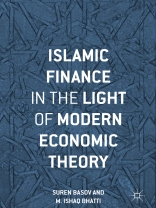This book provides researchers and students with an understanding of the basic legal tenets of the Islamic finance industry, studying the real economic effects of those tenets using the tools of the modern economic theory. Split into four parts, the book begins with an introduction to the history and a legal framework for Islamic banking, covering typical Islamic financial products such as Sukuk and Takaful and examining the structure of Islamic financial institutions. It then analyzes and discusses the Miller-Modigliani Theorem, which is of direct relevance to Islamic banks which are prohibited to charge interest and often have to rely of profit-loss sharing agreements. Part III of the book introduces the reader to modern mechanism design theory, paying particular attention to optimal contracting under hidden action and hidden information, and final part of the book applies the tools of economic theory to understand performance of Islamic financial institutions such as Islamic banks and Takaful operators.
Islamic Finance in Light of Modern Economic Theory brings together all the necessary technical tools for analyzing the economic effects of Islamic frameworks and can be used as an advanced textbook for graduate students who wish to specialize in the area, as a reference for researchers and as a tool to help economists improve the design of Islamic financial institutions.
สารบัญ
Part I. Islamic finance: rationale, history, instruments and the legal framework.- 1. Introduction.- 2. Islamic financial instruments.- 3. Historical roots and evolution of Islamic financial thought.- Part II. Law of unexpected consequences.- 4. The incidence of taxation.- 5. Basics of Corporate Finance: Miller-Modigliani (MM) Theorem.- Part III. Game theory and mechanism design.- 6. Game theory.- 7. Revelation Principle.- 8. Monopolistic Screening.- 9. The multi-dimensional screening model.- Part IV. Mechanism design applications to Islamic finance.- 10. Business loans, trust and contract restriction faced by Islamic banks.- 11. Loans provision and adverse selection within orthodox religious communities.- 12. Shariah compliance and risk-inventive trade-offs.-
13. Shariah compliance, positive assortative matching and performance of Islamic financial institutions.- 14. Optimal Incentives for Takaful operators. 15. When short-selling prohibition can be optimal?.- Part V. Conclusions
เกี่ยวกับผู้แต่ง
Suren Basov obtained a Ph D in Economics in 2001 from Boston University. He held positions at University of Melbourne and La Trobe University and is currently a visiting scholar at Deakin University. Over the course of his career he has published extensively in the field of economic theory and Islamic Finance in leading international journals.
M. Ishaq Bhatti is the founding Director of Islamic Banking and Finance Program at Latrobe University. Previously, he worked at Monash, Islamic University, UAE, Kuwait and Saudi Arabia. He is an award-winning teacher and has authored more than 100 articles and five books. He consults for IDB, Aus Trade, Vict. Dept of Education, Iraqi, Turkish & Pakistani central Banks and is an Advisory Board member of the National Zakat Foundation (NZF) of Australia. He is also involved in ‘Zakat@ICV’ and NILS-No interest loan Qard Hassan, and is editor of an Islamic Business Series published by Routledge.












